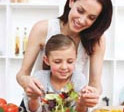Food safety

What does food safety mean?
''Safe'' food is not contaminated by any harmful organisms and/or chemicals that could cause illness. At SPAR we are cautious about how we handle food, and know that safety in food preparation can decrease the risk of contamination by harmful bacteria.
Our role in food safety
At SPAR, we are committed to maintaining the high standards of our SPAR Brand, Tender and Tasty and Freshline products in the following ways:
-
We specially select the growers, farmers and producers of our Private Label products.
-
We ensure that they conform to high standards of hygiene and quality in production by using external auditors to inspect them.
-
We regularly visit suppliers to ensure they maintain these high standards.
-
We inspect products delivered to our distribution centres to ensure that they are of the correct quality and temperature.
-
We maintain high standards of product deliveries to over 800 stores throughout the country.
Your role in food safety
Contamination can occur at any stage of food handling but with these easy steps, you too can ensure that food remains safe to eat.
When buying food from your SPAR store
-
Buy your fresh meat, dairy and frozen goods LAST so that they remain at the right temperature, preventing bacteria from multiplying.
-
Take food straight home to re-pack in your fridge or freezer. If you know that you have to stop somewhere else, take a cooler box to pack these goods into or they will defrost. It is not safe to re-freeze products once they have defrosted.
-
When choosing products, ensure that the product has not been tampered with and has not passed its sell-by date.
-
Once the sell-by date has been passed the product should not be on the shelf. If this is the case, please assist us by informing the Manager of the store immediately.
-
Some products may have a sell-by and best-before/use-by date. At home you should use products by the best-before or use-by date. This is especially important for meat, chicken, pork, dairy products and cut veg or fruit.
-
When buying tinned food, check that the tins are not rusted, dented, leaking or bulging.
When you get home
-
KEEP COLD FOOD COLD AND HOT FOOD HOT because bacteria grows well between 4º C and 65º C
-
To defrost a product, defrost it in the fridge, not outside in the sun as this may cause the outer surface of the product to reach a higher temperature ? while the inside remains frozen and then may not cook properly - this could result in food poisoning.
-
When defrosting the product in the fridge, keep on the bottom shelf to ensure that meat and poultry juices do not drip onto other food.
-
To defrost a product quickly, place in cool water in the sink, ensuring it is
well wrapped. Change the water every hour. Cook the product immediately after defrosting. Alternatively, defrost in the microwave but cook the product immediately.
-
Ensure food is cooked at a sufficiently high temperature and kept at that temperature until serving.
-
Cool leftovers outside the fridge for no longer than one hour, then place in the fridge. Place them in a shallow dish to cool down quickly.
-
Either eat leftovers cold or heat them sufficiently.
-
Always wash ALL fruit, salad items and vegetables - especially if they are to be eaten raw.
-
Use clean and different chopping boards for raw and fresh ingredients to avoid any cross-contamination, e.g. from raw chicken to a salad.
-
Remember to use different knives too!
-
Wash your chopping boards very well in hot, soapy water after use.
-
Wash dishcloths often.
Remember to wash hands after
-
Handling pets.
-
Blowing your nose.
-
Going to the toilet.
-
Doing your hair.
-
Before handling any food.
-
After handling any food, especially raw meat, chicken and fish.
Always wash hands well with soapy water - preferably a liquid or anti-bacterial soap. Wash between your fingers, under your nails and up to your wrists. Rinse your hands under running water. Dry with paper towels as bacteria love to grow on hand towels!
If food is handled safely, the likelihood of any food-borne illness is low. That is why we stress the correct handling of foodstuffs - from our side and from yours.
**If you have any further queries on food safety issues, click on the ''Ask the Dietitian'' to pose a question to our Registered Dietitian who is also our Group Food Safety Manager.